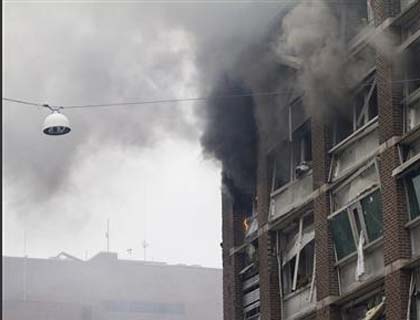A gunman dressed in police uniform opened fire at a youth camp of Norway's ruling political party Friday, killing at least 10 people, hours after a bomb killed seven in the government district in the capital Oslo.
Witnesses said the gunman, identified by police as a 32-year-old Norwegian, moved across the small, wooded Utoeya holiday island firing at random at young people gathered for a meeting of the youth group of Prime Minister Jens Stoltenberg's ruling Labor party.
Norwegian television TV2 said the gunman, described as tall and blond, had links to right-wing extremism.
It was the biggest attack in Western Europe since the 2005 London transport bombings that killed 52.
"I saw young people running around, jumping into the water," Kristine Melby, who lives across the narrow channel on the Norwegian mainland, told Al Jazeera television. "We heard people screaming."
Many sought shelter in buildings as shots echoed across the island, ran into the woods or tried to swim to safety.
"There was a lot of shooting ... We hid under a bed. It was very terrifying," a young woman at the camp told British Sky television.
Police arrested the gunman, who they believed was also linked to the bombing, and later found undetonated explosives on the island, to the northwest of Oslo.
The bomb, which shook the city center in mid-afternoon, blew out the windows of the prime minister's building and damaged the finance and oil ministry buildings. Stoltenberg was not in the building at the time.
"People ran in panic," said bystander Kjersti Vedun.
With police advising people to evacuate central Oslo, and some soldiers taking up positions on the streets, the usually sleepy capital was gripped by fear of fresh attacks. Streets were strewn with shattered masonry, glass and twisted steel.
"It is the most violent event to strike Norway since World War Two," said Geir Bekkevold, an opposition parliamentarian for the Christian Peoples Party.
"I have a message to the one who attacked us and those who were behind this," Prime Minister Stoltenberg said in a televised news conference. "No one will bomb us to silence, no one will shoot us to silence."
He declined to speculate on who had been involved.
OKLAHOMA BOMBING
NUPI Senior Research Fellow Jakub Godzimirski said he suspected a right-winger, rather than any Islamist group. Right wing groups have grown up in Norway and elsewhere in northern Europe around the issue of immigration.
"It would be very odd for Islamists to have a local political angle. The attack on the Labor youth meeting suggests it's something else. If Islamists wanted to attack, they could have set off a bomb in a nearby shopping mall rather than a remote island."
Right-wing militancy has generated sporadic attacks in other countries, including the United States. In 1995, 168 people were killed when Timothy McVeigh detonated a truck bomb at a federal building in Oklahoma City.
Deputy Oslo police chief Sveining Sponheim told reporters that the gunman in the Utoeya shootings had been disguised in a blue police-style uniform but had never been a police officer.
Police searched a flat in west Oslo where the man lived, and evacuated some neighbors.
NATO member Norway has been the target of threats before over its involvement in conflicts in Afghanistan and Libya.
Violence or the threat of it has already come to the other Nordic states: a botched bomb attack took place in the Swedish capital Stockholm last December and the bomber was killed.
Denmark has received repeated threats after a newspaper published cartoons of the Prophet Mohammad in late 2005, angering Muslims worldwide.
In Oslo, the building of a publisher which recently put out a translation of a Danish book on the cartoon controversy was also affected, but was apparently not the target.
The Oslo district attacked is the very heart of power in Norway. Nevertheless, security is not tight in a country unused to such violence and better known for awarding the Nobel Peace Prize and mediating in conflicts, including the Middle East and Sri Lanka.(Reuters)

